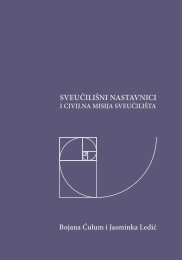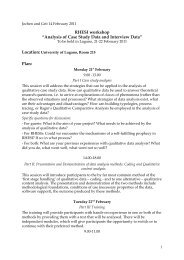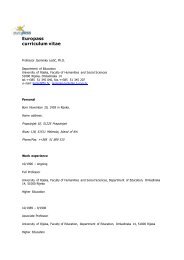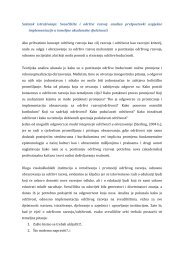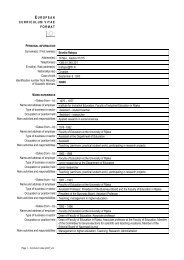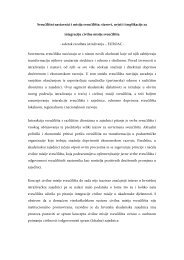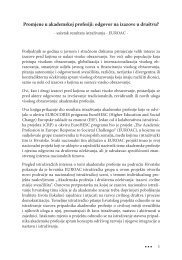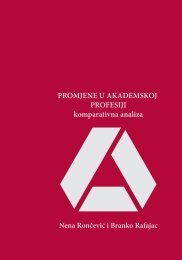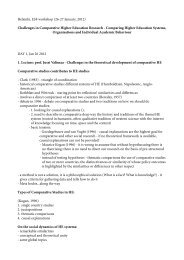Some problems in international comparative research - euroac
Some problems in international comparative research - euroac
Some problems in international comparative research - euroac
You also want an ePaper? Increase the reach of your titles
YUMPU automatically turns print PDFs into web optimized ePapers that Google loves.
***** HALLORAN ********* EJC/REC Vol. 5, No. 2&3, 1995 *****<br />
SOME PROBLEMS IN INTERNATIONAL COMPARATIVE RESEARCH<br />
James D. Halloran<br />
University of Leicester<br />
Abstract: This article exam<strong>in</strong>es some of the<br />
<strong>problems</strong> and difficulties encountered <strong>in</strong><br />
<strong>in</strong>ternational <strong>comparative</strong> <strong>research</strong> programmes <strong>in</strong><br />
mass communications. To ensure comparability the<br />
units of analysis should be determ<strong>in</strong>ed by the<br />
nature of the <strong>research</strong>, its aims and objectives<br />
and it is essential to be clear about what,<br />
precisely, is be<strong>in</strong>g compared. The lack of<br />
consensus manifested <strong>in</strong> dichotomization <strong>in</strong>to<br />
'conventional' and 'critical' approaches is one of<br />
the crucial issues aris<strong>in</strong>g from the nature of<br />
social science. The other is suitability of<br />
exported models, theories, concepts and methods to<br />
Third World conditions. The one-way flow has<br />
existed <strong>in</strong> <strong>research</strong> as well, but the<br />
<strong>in</strong>digenization of social science cannot be<br />
dismissed although it could lead to further<br />
weaken<strong>in</strong>g of consensus. The experiences from<br />
former <strong>research</strong>, which are reviewed <strong>in</strong> this paper,<br />
should give us advice regard<strong>in</strong>g what we should not<br />
do and where we should not go.<br />
The task I have been given is to exam<strong>in</strong>e some of the<br />
<strong>problems</strong> and difficulties likely to be encountered <strong>in</strong><br />
design<strong>in</strong>g and execut<strong>in</strong>g <strong>in</strong>ternational, <strong>comparative</strong> <strong>research</strong><br />
programmes <strong>in</strong> mass communications. I shall do this, <strong>in</strong>ter<br />
alia, by draw<strong>in</strong>g on my <strong>research</strong> experience over thirty<br />
years, dur<strong>in</strong>g which time I have been responsible for, or<br />
contributed to, some twelve <strong>in</strong>ternational <strong>research</strong><br />
exercises, with participat<strong>in</strong>g countries rang<strong>in</strong>g from three<br />
to over twenty <strong>in</strong> any given project.<br />
Lessons Learned?<br />
The immediate purpose of this exam<strong>in</strong>ation on this
occasion is to see what, if anyth<strong>in</strong>g, can be learned from<br />
past <strong>research</strong> which might contribute to the current<br />
discussions on the possibility of develop<strong>in</strong>g a new<br />
<strong>in</strong>ternational news flow study. This might be conceived as a<br />
follow-up to the earlier study, <strong>in</strong>volv<strong>in</strong>g twenty-n<strong>in</strong>e<br />
countries, which was carried out <strong>in</strong> 1979, and reported <strong>in</strong> a<br />
UNESCO publication <strong>in</strong> 1985.[1]<br />
There can be no doubt that we should have learned<br />
someth<strong>in</strong>g -- not least from the aforementioned study. There<br />
have been plenty of opportunities, and relevant publications<br />
are available.[2] Unfortunately, as the discussions on<br />
future <strong>research</strong> possibilities have clearly illustrated, we<br />
do not seem to learn from the past as we should do;<br />
sometimes it appears that we are not even aware of the past,<br />
fail<strong>in</strong>g to accept that social science without history is<br />
bl<strong>in</strong>d and wasteful. So often, at these <strong>in</strong>ternational<br />
<strong>research</strong> meet<strong>in</strong>gs, it is impossible to escape a deja vu<br />
feel<strong>in</strong>g, as so many attempts are made to re-<strong>in</strong>vent the<br />
wheel. Social scientists rarely seem to apply social<br />
science to social science.<br />
We may divide the <strong>problems</strong> and difficulties <strong>in</strong><br />
<strong>comparative</strong> <strong>research</strong> <strong>in</strong>to two broad categories, namely<br />
adm<strong>in</strong>istrative and social scientific. In this presentation<br />
I <strong>in</strong>tend to give more attention to the latter, although<br />
readily accept<strong>in</strong>g that the two types of <strong>problems</strong> should not<br />
be seen <strong>in</strong> watertight compartments. For, as I shall show,<br />
f<strong>in</strong>ancial, practical, logistical, political, cultural and<br />
<strong>in</strong>stitutional considerations <strong>in</strong>variably play an important<br />
part <strong>in</strong> circumscrib<strong>in</strong>g or facilitat<strong>in</strong>g the social scientific<br />
effort.<br />
These days we are frequently told that social science<br />
is now <strong>in</strong> a position to benefit tremendously from<br />
technological developments and that, consequently, what was<br />
extremely difficult or even impossible a decade ago <strong>in</strong><br />
<strong>in</strong>ternational <strong>comparative</strong> <strong>research</strong>, is now much simpler and<br />
more straightforward. It would, of course, be foolish to<br />
turn one's back on these developments, but we would do well<br />
to remember that technology, and methods generally, are but<br />
a means to an end. The wheels may now be capable of<br />
gr<strong>in</strong>d<strong>in</strong>g more effectively, what what about the grist? What<br />
do we put <strong>in</strong>to the mill? What questions are we ask<strong>in</strong>g?<br />
What are our aims and objectives? How do we def<strong>in</strong>e our
<strong>problems</strong>?<br />
It is when we come to these sorts of questions, and<br />
when we try to apply them to any possible future news flow<br />
study, that I become concerned about what progress has<br />
really been made <strong>in</strong> this field over the last quarter of a<br />
century. We might have more convenient and more economical<br />
methods at our disposal, but are we adequately equipped<br />
<strong>in</strong>tellectually to effectively use these methods, or even<br />
better equipped <strong>in</strong>tellectually than we were some twenty or<br />
thirty years ago?<br />
I shall return to these matters later, but at this<br />
stage I th<strong>in</strong>k it would be worth while to look at the first<br />
foreign news study and see how it was conceived and<br />
developed, identify<strong>in</strong>g some of the crucial factors <strong>in</strong> its<br />
passage.<br />
The first foreign news study was carried out <strong>in</strong> 1979.<br />
It stemmed from the development of a cooperative work<strong>in</strong>g<br />
relationship between UNESCO and the International<br />
Association for Mass Communication Research which dated from<br />
the UNESCO Montreal Conference <strong>in</strong> 1969. This conference has<br />
been recognized, by friend and foe alike, as constitut<strong>in</strong>g "a<br />
watershed <strong>in</strong> <strong>in</strong>ternational communication <strong>research</strong>",<br />
particularly as far as UNESCO's <strong>in</strong>volvement was concerned.<br />
At the risk of oversimplification, it marked a shift from a<br />
conventional, ma<strong>in</strong>ly service, adm<strong>in</strong>istrative and western<br />
dom<strong>in</strong>ated approach, to a more critical approach with a wider<br />
sociological orientation.<br />
The record suggests that UNESCO would not have been<br />
<strong>in</strong>volved <strong>in</strong> such a potentially critical study as the news<br />
study prior to the Montreal Conference and unfortunately,<br />
more recent records clearly <strong>in</strong>dicate that its <strong>in</strong>volvement <strong>in</strong><br />
this sort of work was short-lived. I have dealt elsewhere<br />
[3] with the wider political ramifications of these<br />
developments; suffice it to state here that UNESCO's<br />
paymasters were not go<strong>in</strong>g to fund <strong>research</strong> that might<br />
challenge the status quo and their own <strong>in</strong>ternational vested<br />
<strong>in</strong>terests.<br />
In a sense, then, the first news study was a response<br />
to a particular form of social-political concern, and it<br />
reflected a relatively new and by no means universally
popular, social scientific approach. This need not be a bad<br />
th<strong>in</strong>g <strong>in</strong> itself, but when the concern is not uniformly<br />
experienced or <strong>in</strong>terpreted, and the approach not adequately<br />
understood by all the participat<strong>in</strong>g countries it often can,<br />
and <strong>in</strong> this case did, lead to a series of "political<br />
compromises" at several levels.<br />
These compromises -- well nigh <strong>in</strong>evitable <strong>in</strong> the<br />
<strong>in</strong>ternational arena at that time -- do not make for good<br />
social science and, <strong>in</strong> the circumstances, it was not far<br />
short of miraculous that the work was successfully completed<br />
and, above all, that a useful and <strong>in</strong>terest<strong>in</strong>g report f<strong>in</strong>ally<br />
emerged.<br />
Of course, to write about "good social science" raises<br />
more questions than it solves, for not all the <strong>problems</strong><br />
encountered <strong>in</strong> the news study stemmed from the external<br />
conditions just outl<strong>in</strong>ed - the <strong>in</strong>ternal nature of social<br />
science/mass communication <strong>research</strong> was at least equally to<br />
blame.<br />
This is not the place for a detailed discussion on the<br />
nature of social science but, <strong>in</strong> review<strong>in</strong>g old studies and<br />
attempt<strong>in</strong>g to use these to <strong>in</strong>form new ones, there are<br />
certa<strong>in</strong> fundamental features that must be borne <strong>in</strong> m<strong>in</strong>d.<br />
Nearly 30 years ago our host <strong>in</strong> Tampere, Kaarle<br />
Nordenstreng, characterized ma<strong>in</strong>stream, conventional<br />
communication <strong>research</strong> <strong>in</strong> the USA as be<strong>in</strong>g concerned with<br />
"do<strong>in</strong>g rather than with th<strong>in</strong>k<strong>in</strong>g". Around the same time an<br />
American sociologist, Charles Wright, commented on the<br />
theoretical paucity of so much of mass communication<br />
<strong>research</strong> which was marked by crude conceptualization, a lack<br />
of hypotheses and the predom<strong>in</strong>ance of means over ends. In a<br />
similar ve<strong>in</strong>, I concluded a review of the field by ask<strong>in</strong>g<br />
why it was that so many <strong>research</strong> reports seemed to consist<br />
of allegedly def<strong>in</strong>itive statistical statements about the<br />
irrelevant, the trivial, the <strong>in</strong>consequential and sometimes<br />
the pla<strong>in</strong>ly <strong>in</strong>valid?<br />
As <strong>in</strong>dicated earlier, this type of conventional<br />
approach did not go unchallenged, particularly after the<br />
Montreal Conference, but it still underp<strong>in</strong>ned the vast bulk<br />
of <strong>research</strong> that was carried out at the time, and no doubt<br />
still does to this day. It certa<strong>in</strong>ly was an important part
of the ethos with<strong>in</strong> which the news study was conceived and<br />
executed. Moreover, just to make matters more complicated,<br />
the critical approach attracted its extremists, whose<br />
preference for an ideological package tour frequently led<br />
them to regard hard evidence as irrelevant. Plann<strong>in</strong>g an<br />
<strong>in</strong>ternational <strong>comparative</strong> study <strong>in</strong>volv<strong>in</strong>g over twenty<br />
countries was no simple matter twenty years ago, and recent<br />
exchanges, at this meet<strong>in</strong>g and elsewhere, <strong>in</strong>dicate that many<br />
of the <strong>problems</strong> we experienced then are still with us.<br />
I do not wish to imply that there has been no progress<br />
<strong>in</strong> mass communication <strong>research</strong> over the last quarter of a<br />
century, although it should be obvious now that what I might<br />
regard as "progress" is not so regarded by all who work <strong>in</strong><br />
this field, <strong>in</strong>clud<strong>in</strong>g some who might wish to take part <strong>in</strong><br />
any future study. One needs to bear this <strong>in</strong> m<strong>in</strong>d <strong>in</strong> what<br />
follows.<br />
Methodology<br />
At the risk of oversimplify<strong>in</strong>g the issue it may be said<br />
that, over the last thirty years or so, there has been a<br />
greater will<strong>in</strong>gness to accept that, <strong>in</strong> <strong>in</strong>ternational<br />
<strong>comparative</strong> <strong>research</strong>, there was no need for all the<br />
participat<strong>in</strong>g countries to rigidly and mechanically apply<br />
the same agreed <strong>in</strong>struments and that a more flexible,<br />
sociological orientation which recognized national,<br />
cultural, social and l<strong>in</strong>guistic differences, and the<br />
implications of these differences for design and data<br />
collection, had its advantages. Put briefly, it was<br />
recognized that, except <strong>in</strong> the most simple of categories,<br />
different questions, at least differently presented<br />
questions (reflect<strong>in</strong>g differences <strong>in</strong> culture, language,<br />
etc.) -- not the same questions -- would be necessary to<br />
evoke the same _type_ of <strong>in</strong>formation <strong>in</strong> the different<br />
circumstances. This would hold even when the <strong>research</strong> was<br />
deal<strong>in</strong>g with what might be termed the _"common<br />
denom<strong>in</strong>ator"_, i.e. the area of enquiry <strong>in</strong>cluded <strong>in</strong> the work<br />
of all the participat<strong>in</strong>g countries. Moreover, <strong>in</strong> addition<br />
to this, it came to be accepted that, <strong>in</strong> order to do justice<br />
to the complexity of the subject matter, it would be<br />
necessary for each country to <strong>in</strong>clude special segments <strong>in</strong><br />
their enquiries which, amongst other th<strong>in</strong>gs, would<br />
facilitate a deeper understand<strong>in</strong>g of national differences.
One f<strong>in</strong>al general po<strong>in</strong>t <strong>in</strong> this connection was that the<br />
hard/soft, quantitative/qualitative, hierarchical dichotomy<br />
with regard to data was rejected. Wherever possible<br />
attempts were made to blend the two. For example,<br />
quantitative data could be enriched and ref<strong>in</strong>ed by data<br />
ga<strong>in</strong>ed from more ethnographic and anthropological approaches<br />
-- both be<strong>in</strong>g equally valid and useful.[4]<br />
Let us now look <strong>in</strong> a little more detail at the<br />
significance of this shift <strong>in</strong> the mode of enquiry.<br />
<strong>Some</strong> of the <strong>research</strong>ers have recognized for some time<br />
that <strong>in</strong>ternational <strong>comparative</strong> <strong>research</strong> was bedevilled not<br />
only by understandable and <strong>in</strong>evitable <strong>problems</strong> (practical,<br />
logistical, policies, <strong>research</strong> <strong>in</strong>terests, resources, etc.)<br />
but also by misconceptions and misunderstand<strong>in</strong>gs about the<br />
very nature and potential of this type of <strong>research</strong>. Above<br />
all, it was felt that there was a need to ask what was<br />
really meant by <strong>comparative</strong> studies, and what should be the<br />
essence of the units of <strong>comparative</strong> analysis?<br />
The units of analysis selected <strong>in</strong> any given project are<br />
essentially determ<strong>in</strong>ed by the nature of the <strong>research</strong> and its<br />
aims and objectives. Unfortunately, this is not always<br />
clearly understood. For example, <strong>in</strong> one project <strong>in</strong> which I<br />
was <strong>in</strong>volved, which focussed on producers and their<br />
knowledge of their audience, the po<strong>in</strong>t was raised, as a<br />
criticism, that the children <strong>in</strong> the different countries were<br />
not all of the same age. Age may be central <strong>in</strong> some<br />
studies, but the important factor <strong>in</strong> this particular study<br />
was that the ma<strong>in</strong> unit of comparison was not young people of<br />
the same age <strong>in</strong> different countries, but the relationship<br />
between the broadcast<strong>in</strong>g <strong>in</strong>stitutions and broadcasters on<br />
the one hand, and their target audience (which might be<br />
13/14 years <strong>in</strong> one country, 12/13 years <strong>in</strong> another) on the<br />
other. The match, or lack of it, between the two and the<br />
factors that <strong>in</strong>fluenced both provision and reaction to<br />
provision, were what mattered, and what had to be analysed.<br />
With regard to another project it had to be emphasized<br />
that comparability should not be conf<strong>in</strong>ed to simple, and<br />
somewhat obvious comparisons of age, sex, etc. The aims of<br />
the <strong>research</strong> <strong>in</strong> question meant that it was not adequate to<br />
compare the media behaviour of, say, farmworkers <strong>in</strong> Hungary<br />
and fishermen <strong>in</strong> Canada. It was necessary, <strong>in</strong> this
particular case, that the comparisons should centre on the<br />
way <strong>in</strong> which the different media systems were organized and<br />
the differences <strong>in</strong> what was provided, how the provision was<br />
used by different groups with<strong>in</strong> the society, (e.g., farmers<br />
and fishermen), and what were the consequences of that use<br />
<strong>in</strong> the different countries <strong>in</strong> relation to the selected<br />
objectives of the <strong>research</strong>. It is absolutely essential to<br />
be clear about what, precisely, is be<strong>in</strong>g compared. Yet so<br />
often this is not clarified, and the situation is further<br />
complicated and obscured by the <strong>in</strong>troduction of conventional<br />
variables (sex, class, age, educational background, etc.,<br />
etc.!), which could be totally irrelevant as far as the ma<strong>in</strong><br />
aims of the specific project are concerned.<br />
There used to be many <strong>research</strong>ers -- <strong>in</strong> fact there are<br />
still some - who automatically accept that even <strong>in</strong> the type<br />
of <strong>research</strong> discussed here [5] the carbon-copy, blue-pr<strong>in</strong>t<br />
application <strong>in</strong> different societies of pre-tested<br />
questionnaire items, <strong>in</strong> a highly structured <strong>research</strong><br />
<strong>in</strong>strument, is capable of provid<strong>in</strong>g data suitable for<br />
genu<strong>in</strong>e <strong>comparative</strong> analysis. The position held here is<br />
that unless the "analysis" is conf<strong>in</strong>ed to very simple<br />
categories this approach is mean<strong>in</strong>gless, and is likely to<br />
produce <strong>in</strong>valid and mislead<strong>in</strong>g <strong>in</strong>formation.<br />
It is important to stress that language does not<br />
develop <strong>in</strong> a vacuum, and that words, phrases, sentences,<br />
questions, etc., have mean<strong>in</strong>gs only with<strong>in</strong> given cultural,<br />
or even sub-cultural contexts. Consequently, it would be a<br />
mistake to attempt to produce uniformity <strong>in</strong> the verbal<br />
stimulus (questionnaire items) <strong>in</strong> a universe which is likely<br />
to be characterized by l<strong>in</strong>guistic-cultural pluralism. The<br />
task is to make sure, <strong>in</strong> the various societies/cultures <strong>in</strong><br />
which the <strong>research</strong> is be<strong>in</strong>g carried out, that the verbal<br />
stimulus or question used <strong>in</strong> the <strong>in</strong>terview or survey, or the<br />
cod<strong>in</strong>g category <strong>in</strong> the analysis of news, is the one most<br />
capable of elicit<strong>in</strong>g the precise type of <strong>in</strong>formation that<br />
the objectives require. Real comparability is obta<strong>in</strong>ed at<br />
this level of analysis, not at question item level. In<br />
different cultures -- because they are different -different<br />
questions have to be asked (<strong>in</strong> different ways) to<br />
obta<strong>in</strong> the same sort of <strong>in</strong>formation. Compar<strong>in</strong>g the answers<br />
to allegedly identical questions asked <strong>in</strong> different<br />
countries is not necessarily compar<strong>in</strong>g like with like, as<br />
some would have us believe.
Tak<strong>in</strong>g another specific example from some <strong>research</strong> on<br />
Foreign Images it was discovered that personal contacts with<br />
foreigners meant totally different th<strong>in</strong>gs <strong>in</strong> different<br />
countries. In Canada, England and Germany the dom<strong>in</strong>ant form<br />
of contact could be liv<strong>in</strong>g <strong>in</strong> the same town or neighbourhood<br />
as immigrants, but <strong>in</strong> Hungary it was more likely to consist<br />
of meet<strong>in</strong>g foreign tourists. Whilst <strong>in</strong> some countries<br />
immigrants were seen by the children as com<strong>in</strong>g from<br />
economically less developed cultures, <strong>in</strong> Hungary the<br />
tourists (quite different from immigrants or workers, but<br />
the ma<strong>in</strong> source of foreign contact nonetheless), were more<br />
likely to be seen as representatives of an economically more<br />
developed society. Generally, this meant that high<br />
contact/low contact had totally different implications <strong>in</strong><br />
different countries <strong>in</strong> terms of both the nature of the<br />
contact and its wider effects. This demonstrates that it is<br />
not valid to attempt an item by item, precise comparison<br />
between the various participat<strong>in</strong>g countries. The unit of<br />
comparison should be the nature, the essence of the<br />
<strong>in</strong>formation sought and evoked under certa<strong>in</strong> agreed<br />
categories.<br />
In most <strong>comparative</strong> <strong>research</strong> attempts are usually made<br />
to achieve the widest possible band of agreement so that<br />
comparisons can be attempted on a wide scale. Even so, it<br />
has to be recognized that it would be quite artificial and<br />
mislead<strong>in</strong>g to ignore real national differences at<br />
structural, <strong>in</strong>stitutional and cultural levels.<br />
Consequently, it is often appropriate -- <strong>in</strong> fact necessary<br />
-- for the <strong>research</strong>ers to pursue some l<strong>in</strong>es of enquiry which<br />
would be relevant only - <strong>in</strong> their own country.<br />
However, sometimes there is a price to pay for this<br />
flexibility. In certa<strong>in</strong> circumstances the flexibility could<br />
result <strong>in</strong> <strong>in</strong>sufficient attention be<strong>in</strong>g given to the ma<strong>in</strong><br />
<strong>comparative</strong> elements -- the common denom<strong>in</strong>ators -- and might<br />
possibly lead to someth<strong>in</strong>g approach<strong>in</strong>g anarchy <strong>in</strong><br />
presentation. In the design and plann<strong>in</strong>g it is necessary to<br />
strike the right balance between the common and the<br />
particular.<br />
In any k<strong>in</strong>d of <strong>comparative</strong> <strong>research</strong> it is not very<br />
useful simply to provide an item by item <strong>in</strong>ventory of<br />
similarities and differences from the various participat<strong>in</strong>g
countries. The studies from the various countries need to<br />
be <strong>in</strong>tegrated or compared <strong>in</strong> relation to some model or set<br />
of guidel<strong>in</strong>es. These guidel<strong>in</strong>es make it possible to impose<br />
some sort of mean<strong>in</strong>g and coherence on what would otherwise<br />
be a relatively mean<strong>in</strong>gless collection of snippets and<br />
fragments. In other words, to be useful data have to be<br />
classified, analysed and <strong>in</strong>terpreted <strong>in</strong> relation to a chosen<br />
set of pr<strong>in</strong>ciples, for data never speak for themselves.<br />
But, of course, there is not just one model, or one set of<br />
pr<strong>in</strong>ciples -- several may be available, so choices have to<br />
be made, and there are often fundamental disagreements<br />
amongst the participants. In the circumstances this lack of<br />
consensus is almost <strong>in</strong>evitable. What matters is to be clear<br />
as to what guidel<strong>in</strong>es or models have been used, and to<br />
articulate this and specify the reasons for the choice. In<br />
studies such as these there is no room for spurious<br />
objectivity.<br />
It is important to note that the above comments about<br />
the <strong>in</strong>tegration of data <strong>in</strong> accordance with selected<br />
guidel<strong>in</strong>es or frameworks is more of a statement of an ideal<br />
than an accurate description of what normally happens <strong>in</strong><br />
<strong>comparative</strong> <strong>research</strong>.<br />
It is perhaps convenient that discussion of these<br />
methodological <strong>problems</strong> now enables us to return to some of<br />
the basic issues <strong>in</strong> relation to social scientific <strong>research</strong><br />
which I mentioned earlier. Moreover, these <strong>problems</strong> and<br />
issues create certa<strong>in</strong> difficulties with regard to the<br />
dissem<strong>in</strong>ation and acceptance of <strong>research</strong> results and, as<br />
will be seen, they are also relevant to any consideration as<br />
to the possibility of carry<strong>in</strong>g out <strong>research</strong> <strong>in</strong> Third World<br />
countries.<br />
Basic Issues<br />
Let us then focus on two ma<strong>in</strong> aspects of what I regard<br />
as a very crucial issue - crucial to the nature and scope of<br />
social science and, <strong>in</strong> particular, to the application of<br />
social science, <strong>in</strong>clud<strong>in</strong>g mass communication <strong>research</strong>, to<br />
Third World situations. The first has to do with the lack<br />
of consensus <strong>in</strong> mass communication <strong>research</strong>, and <strong>in</strong> social<br />
science generally. The crude dichotemization <strong>in</strong>to<br />
"conventional" and "critical" approaches, which I have used<br />
from time to time, is an example of this. These gross
categories conceal as much as they reveal, for they are by<br />
no means homogeneous. Although there are differences with<strong>in</strong><br />
as well as between, they reflect the ma<strong>in</strong> basic divisions<br />
between the Aristotelian hermeneutic approaches and the<br />
Galilean positivistic approaches which have characterized so<br />
much of conventional communication <strong>research</strong>. At this stage<br />
our ma<strong>in</strong> concern, without tak<strong>in</strong>g sides or without dismiss<strong>in</strong>g<br />
any of the approaches as illegitimate, is with the<br />
implications of this lack of consensus of these "warr<strong>in</strong>g<br />
schools", and the "ferment <strong>in</strong> the field" <strong>in</strong> an allegedly<br />
scientific exercise.<br />
The situation becomes even more problematic when we add<br />
geographical and stage-of-development components to those<br />
contribut<strong>in</strong>g to the lack of consensus, and to the<br />
discont<strong>in</strong>uities already mentioned. There is ample evidence<br />
<strong>in</strong> mass communication <strong>research</strong>, as we saw earlier, to<br />
suggest that cultural, regional and national differences<br />
profoundly <strong>in</strong>fluence the <strong>research</strong> effort at all stages and<br />
levels.<br />
But we should not expect to be free from such<br />
<strong>in</strong>fluences. It is not surpris<strong>in</strong>g if, <strong>in</strong> a situation of<br />
conflict<strong>in</strong>g ideologies and other geo-cultural differences,<br />
we f<strong>in</strong>d disagreements across a wide range of relevant<br />
factors, <strong>in</strong>clud<strong>in</strong>g aims, purposes, needs, theories,<br />
conceptualization, design and methods. The different<br />
schools actually look for evidence (selectively def<strong>in</strong>ed, of<br />
course) <strong>in</strong> different places, and employ different criteria<br />
<strong>in</strong> assess<strong>in</strong>g its validity. In such circumstances dialogue,<br />
mean<strong>in</strong>gful exchanges and constructive debate are extremely<br />
difficult, if not impossible. The necessary common<br />
referrents and agreed basic assumptions are lack<strong>in</strong>g, as is<br />
the overlap <strong>in</strong> the respective fields of discourse which is<br />
the s<strong>in</strong>e qua non of effective communication.<br />
Yet we talk of "social _science_", emphasize the<br />
importance of _scientific method_, and <strong>in</strong> many cases act as<br />
though, once we have progressed beyond the understandable<br />
confusion and uncerta<strong>in</strong>ty associated with the embryonic<br />
stage of development, we shall be able to rid ourselves of<br />
the conflicts, contradictions and discont<strong>in</strong>uities and reach<br />
the holy grail of consensus, the hallmark of "real science".<br />
But, realistically, what are the chances of this? Of
course there are differences with<strong>in</strong> the natural and physical<br />
sciences, but on the whole they are not of the k<strong>in</strong>d which<br />
make constructive dialogue well nigh impossible. If<br />
consensus is a mark of scientific maturity, as some would<br />
claim, then the social sciences are not very mature. What<br />
is more, it is possible that, by their very nature, the<br />
social sciences will never be able to grow up or mature _<strong>in</strong><br />
this way_. This could mean that new criteria of development<br />
and maturity are required -- perhaps "healthy, critical<br />
dissensus"! The cont<strong>in</strong>ued use of natural science as a model<br />
for social science may not be appropriate.<br />
In suggest<strong>in</strong>g this I am by no means wish<strong>in</strong>g to signal<br />
the end of mass communication <strong>research</strong> or <strong>in</strong>ternational<br />
<strong>comparative</strong> studies. Systematic, discipl<strong>in</strong>ed, fruitful<br />
studies can still be carried out with<strong>in</strong> an eclectic<br />
framework, and assessed accord<strong>in</strong>gly. This is not an escape<br />
from rigour, but an acceptance of an approach (albeit as yet<br />
by no means a fully developed approach) which is capable of<br />
do<strong>in</strong>g justice to the complex set of relationships,<br />
structures and processes which characterize our field of<br />
study.<br />
Third World Indigenization<br />
The next po<strong>in</strong>t, very closely related to the previous<br />
one, centres on mass communication and media <strong>research</strong> <strong>in</strong><br />
Third World countries. What are we export<strong>in</strong>g from the<br />
so-called developed world <strong>in</strong> <strong>research</strong>? How suitable are<br />
these exported models, theories, concepts, methods, etc.,<br />
for the conditions it is <strong>in</strong>tended that they should address?<br />
Are political, commercial, cultural and media imperialisms<br />
be<strong>in</strong>g followed by <strong>research</strong> imperialism? What forms of<br />
<strong>in</strong>digenization are required, and to what degree should they<br />
be applied? These are just a few of the questions which<br />
should be asked, both directly <strong>in</strong> relation to mass<br />
communication <strong>research</strong>, and more generally and more widely<br />
with regard to the question of universality and relativity<br />
<strong>in</strong> the social sciences. Obviously this last mentioned<br />
matter, important though it is, can only receive pass<strong>in</strong>g<br />
mention here, but it is relevant to our general problem.<br />
Wherever we look <strong>in</strong> <strong>in</strong>ternational communication<br />
<strong>research</strong> -- exports and imports of textbooks, articles and<br />
journals; citations, references and footnotes; employment of
experts (even <strong>in</strong> <strong>in</strong>ternational agencies), and the fund<strong>in</strong>g,<br />
plann<strong>in</strong>g and execution of <strong>research</strong>, we are essentially<br />
look<strong>in</strong>g at a _dependency situation_. This is a situation<br />
which is characterized by a one-way flow of values, ideas,<br />
models, methods and resources from north to south. It may<br />
even be seen more specifically as a flow from the<br />
Anglo-Saxon language fraternity to the rest of the world,<br />
and perhaps even more specifically still, with<strong>in</strong> the<br />
aforementioned parameters, as an <strong>in</strong>stance of a one-way<br />
traffic system which enabled USA-dom<strong>in</strong>ated social science of<br />
the conventional nature to penetrate cultures <strong>in</strong> many parts<br />
of the world which were quite different from the culture <strong>in</strong><br />
the USA. As the USA emerged as a super-power <strong>in</strong> social<br />
science, like it did <strong>in</strong> other spheres, even what little<br />
<strong>in</strong>put there was from other sources tended to be excluded.<br />
To me (although there would be considerable opposition<br />
to this stance), there is no doubt that much of what was<br />
exported from the USA, post-World War II, and the<br />
implications of these exports, were on the whole<br />
detrimental. The exports certa<strong>in</strong>ly did not serve to<br />
<strong>in</strong>crease our understand<strong>in</strong>g of the Third World and its<br />
communication requirements, nor did they facilitate<br />
development <strong>in</strong> any way.<br />
Daniel Lerner's extremely <strong>in</strong>fluential work on _The<br />
Pass<strong>in</strong>g of Traditional Society_ was a prime example of this,<br />
irrespective of whether or not it is regarded as an artefact<br />
of the cold-war politics of that time. However, it has been<br />
argued that this is not simply a matter of unsuitable<br />
exports -- it is a much more fundamental matter of bad<br />
social science per se. The po<strong>in</strong>t be<strong>in</strong>g made here is that<br />
the pr<strong>in</strong>ciples and models underp<strong>in</strong>n<strong>in</strong>g Lerner's <strong>research</strong><br />
(and much more <strong>research</strong> by others <strong>in</strong> a similar ve<strong>in</strong>) would<br />
not have been adequate <strong>in</strong> any situation, <strong>in</strong>clud<strong>in</strong>g the<br />
situation <strong>in</strong> the USA. To export such models simply<br />
compounded the felony, so to speak. It was not solely a<br />
Third World problem -- it was a social science problem.<br />
This takes us back to the questions already raised<br />
about the very nature, potential and universal applicability<br />
of social science, no matter how free it may be from the<br />
aforementioned condition<strong>in</strong>g. We have plenty of basic<br />
<strong>problems</strong> at the national or regional levels, as we have<br />
already noted, but we must now ask how can we possibly deal
with the <strong>in</strong>creas<strong>in</strong>g diversification with<strong>in</strong> our general field<br />
of communication <strong>research</strong> which <strong>in</strong>evitably stems from the<br />
extension of our <strong>in</strong>vestigations to cultures outside the<br />
cultures with<strong>in</strong> which our ideas and tools were conceived,<br />
developed and articulated?<br />
In general terms, the answer frequently given to this<br />
question is "Indigenization at Several Levels".<br />
Unfortunately, this proposed solution is often put forward<br />
without any apparent recognition that, <strong>in</strong> certa<strong>in</strong><br />
circumstances, it could lead to <strong>in</strong>creas<strong>in</strong>g dissonance and<br />
discont<strong>in</strong>uity, and a further weaken<strong>in</strong>g of the consensus<br />
which many still regard as the hallmark of social scientific<br />
maturity.<br />
The global cry for the <strong>in</strong>digenization of social<br />
scientific and mass communication <strong>research</strong> cannot be<br />
dismissed, but it needs to be treated with reserve <strong>in</strong><br />
certa<strong>in</strong> areas, particularly <strong>in</strong> relation to some of the ways<br />
<strong>in</strong> which it has already been applied. I would have thought<br />
that we could readily accept the need for emerg<strong>in</strong>g nations<br />
and regions to determ<strong>in</strong>e their own <strong>research</strong> policies,<br />
priorities and strategies, rather than hav<strong>in</strong>g them<br />
externally imposed, as was the case so often <strong>in</strong> the past.<br />
The need for home-based <strong>in</strong>stitutions, hous<strong>in</strong>g native staff<br />
capable of carry<strong>in</strong>g out the necessary <strong>research</strong> <strong>in</strong> their own<br />
countries, also appears to be generally acceptable -- at<br />
least on the surface. I <strong>in</strong>sert this "surface" qualification<br />
simply because, for many years now, the case has been<br />
fiercely argued that the situation would improve to the<br />
benefit of Third World countries if the nationals of those<br />
countries were given the opportunity, and the resources, to<br />
enable them to carry out the <strong>research</strong>. But this is far too<br />
simplistic a view, as our experience makes clear, for many<br />
of these nationals have been tra<strong>in</strong>ed as conventional<br />
<strong>research</strong>ers, mostly <strong>in</strong> universities <strong>in</strong> the USA, and seem<br />
unable to free themselves from the ideological shackles of<br />
their educational and professional mentors. In this way<br />
they tend to exacerbate the situation and perpetuate the<br />
error by giv<strong>in</strong>g the "alien import" a national seal of<br />
approval.<br />
The essence of this particular problem of<br />
<strong>in</strong>digenization, particularly as far as <strong>in</strong>ternational<br />
<strong>comparative</strong> <strong>research</strong> is concerned, is at the levels of
language, conceptualization, models, paradigms, theories and<br />
methods, which means that it is central to the more<br />
fundamental <strong>problems</strong> of social science with regard to<br />
universalism and relativism and as to whether we should be<br />
pursu<strong>in</strong>g consensus (<strong>in</strong> part or <strong>in</strong> whole), or accept<strong>in</strong>g the<br />
<strong>in</strong>evitability of dissensus.<br />
Perspectives Ahead<br />
As someone who has been actively <strong>in</strong>volved <strong>in</strong> the<br />
design, plann<strong>in</strong>g, organization, execution and report<strong>in</strong>g of<br />
<strong>in</strong>ternational <strong>comparative</strong> <strong>research</strong> for over a quarter of a<br />
century, my approach to the problem is not from the<br />
armchair, but from the field. There is no panacea and I<br />
have no easy answers; to me the problem is still there. In<br />
fact, the question<strong>in</strong>gs and explorations are only just<br />
beg<strong>in</strong>n<strong>in</strong>g, and there will be much more to question and<br />
explore <strong>in</strong> the years ahead.<br />
However, we know enough from recent experiences <strong>in</strong><br />
<strong>research</strong> programmes to put us on our guard aga<strong>in</strong>st those who<br />
come with new, all embrac<strong>in</strong>g solutions. Hav<strong>in</strong>g rightly<br />
rejected the absolutism of positivism and all its<br />
universalistic implications for <strong>in</strong>ternational <strong>research</strong>, we<br />
must be careful not to jump out of the fry<strong>in</strong>g pan <strong>in</strong>to the<br />
fire. In reject<strong>in</strong>g a position, there is no logical<br />
necessity to wholeheartedly adopt its mirror opposite. Yet<br />
there was some evidence at the Tampere meet<strong>in</strong>g that this is<br />
precisely what some were do<strong>in</strong>g. The danger <strong>in</strong> this<br />
unth<strong>in</strong>k<strong>in</strong>g, knee-jerk reaction is that knowledge is reduced<br />
to mere perspectivalism -- a riot of subjective visions -and<br />
a form of anarchy prevails. There are many examples<br />
today, <strong>in</strong>side and outside our particular field with<strong>in</strong> social<br />
science, which demonstrate the tyranny of the absolutism of<br />
non-absolutism, where anyth<strong>in</strong>g goes and where plural<br />
subjectivism frequently masquerades as knowledge. Useful<br />
<strong>comparative</strong> <strong>research</strong> cannot thrive <strong>in</strong> such conditions which,<br />
<strong>in</strong>cidentally, are also conducive to political paralysis.<br />
So, <strong>in</strong> our explorations, we have to navigate between<br />
Scylla and Charybdis <strong>in</strong> the hope of eventually reach<strong>in</strong>g a<br />
safe port. An accompany<strong>in</strong>g difficulty is that, as yet, we<br />
haven't quite decided on our dest<strong>in</strong>ation -- aga<strong>in</strong>, the<br />
nature of social science! Choices will have to be made and,<br />
<strong>in</strong> the end, we can't dodge the issues of validity or values.
In <strong>comparative</strong> <strong>in</strong>ternational studies we need to start<br />
with an acceptance of differences at all levels. But it is<br />
quite legitimate -- <strong>in</strong> fact necessary -- to proceed from<br />
this base and attempt to identify, establish, articulate and<br />
comb<strong>in</strong>e what, if anyth<strong>in</strong>g, is common. As Paul Hirst argues,<br />
different ways of life may be related by ties of symetric<br />
reciprocity and we may eventually f<strong>in</strong>d common denomitators<br />
-- universals which reflect the nature and needs of every<br />
culture. At least this possibility should not be ruled out,<br />
but it has to be established <strong>in</strong> our <strong>research</strong>, not simply<br />
assumed or taken for granted.<br />
This, then, is what we see when we attempt to look <strong>in</strong>to<br />
the future with the benefit of the experience of the past<br />
and when, <strong>in</strong> our particular case, we contemplate a second<br />
news study. The situation we are discuss<strong>in</strong>g is a complex<br />
and difficult one, but granted the embryonic nature of<br />
developments <strong>in</strong> our field, this should not surprise us, so<br />
there is no need for pessimism. It is better to be<br />
realistic and aware of the <strong>problems</strong>, for only <strong>in</strong> this way<br />
can we address them. In some ways it is the false optimism<br />
and "certa<strong>in</strong>ty" of the positivists that have muddied the<br />
waters, and made th<strong>in</strong>gs more difficult than they might have<br />
been.<br />
I th<strong>in</strong>k that we may say that the picture that emerges<br />
from our overview is one of general guidance rather than<br />
clear, specific l<strong>in</strong>es to follow. However, I would suggest<br />
that there is still a very clear <strong>in</strong>dication that, even if we<br />
don't know exactly what to do or where to go, the picture is<br />
unambiguous as to what we should _not_ do, and where we<br />
should _not_ go. I hope that this has been made clear.<br />
There is one further and f<strong>in</strong>al problem which, so far, I<br />
have only touched on <strong>in</strong> pass<strong>in</strong>g. This has to do with the<br />
dissem<strong>in</strong>ation of our <strong>research</strong> results, and the <strong>in</strong>fluence of<br />
our work on policy and the public debate. The conclusion of<br />
the <strong>research</strong> project is the beg<strong>in</strong>n<strong>in</strong>g, not the end of the<br />
educative task. Another aspect of this problem was<br />
mentioned by one of the contributors when he asked, Why do<br />
we do this work? Why do we want to carry out a second news<br />
study?<br />
There can be little doubt that just as we found
differences <strong>in</strong> the approaches to social science and mass<br />
communication <strong>research</strong>, we shall also f<strong>in</strong>d differences <strong>in</strong><br />
the answers to these questions. <strong>Some</strong> <strong>research</strong>ers, perhaps<br />
most of those <strong>in</strong>terested <strong>in</strong> the news study, although by no<br />
means a uniform group, are probably motivated <strong>in</strong> some way or<br />
other by social concerns and would hope, to put it at its<br />
simplest, that their work might <strong>in</strong>form communication policy<br />
and lead to the more effective meet<strong>in</strong>g of communication<br />
needs -- however these are def<strong>in</strong>ed. On the whole they would<br />
not necessarily regard theoretical sophistication,<br />
methodological rigour and normative concerns as be<strong>in</strong>g<br />
<strong>in</strong>compatible.<br />
But there are others who would object to the <strong>in</strong>clusion<br />
of the normative element (referr<strong>in</strong>g to it as<br />
"politicization"), although <strong>in</strong> consciously espous<strong>in</strong>g<br />
scientific neutrality they would probably not be aware of<br />
the conservative, status quo ma<strong>in</strong>tenance function of their<br />
work. It is worth not<strong>in</strong>g that the safe, uncritical results<br />
from this school are more likely to be fed <strong>in</strong>to policy than<br />
those f<strong>in</strong>d<strong>in</strong>gs which stem from the more challeng<strong>in</strong>g stance<br />
of those whose social concern leads them to ask questions<br />
about the nature and function of exist<strong>in</strong>g systems.<br />
Needless to say the critical school, if <strong>in</strong> fact there<br />
is such a group, is certa<strong>in</strong>ly not homogeneous -- the part<br />
played by "the ideologists" has already been mentioned.<br />
Additionally, there is no shortage of those who might th<strong>in</strong>k<br />
of themselves as belong<strong>in</strong>g who, because of their lack of<br />
discipl<strong>in</strong>e, obscurantist writ<strong>in</strong>gs and alienated stances,<br />
fail to mount any effective challenge.<br />
Quite simply, no one <strong>in</strong>volved <strong>in</strong> policy-mak<strong>in</strong>g is<br />
<strong>in</strong>fluenced by these people, although they seem to <strong>in</strong>crease<br />
<strong>in</strong> numbers with the burgeon<strong>in</strong>g of communication studies.<br />
Their work, such as it is, is not regarded as serious<br />
outside their own <strong>in</strong>cestuous group. They fall back on<br />
themselves manifest<strong>in</strong>g, as Robert Hughes put it, that<br />
"powerlessness corrupts, and absolute powerlessness corrupts<br />
absolutely". In many cases what might at one time have been<br />
a concern with wider social issues gets channeled <strong>in</strong>to an<br />
overrid<strong>in</strong>g concern with self, with one's own existence and<br />
<strong>in</strong>stitutional preservation -- "academic life, and<br />
communication studies for the sake of academic life and<br />
communication studies".
I mention these po<strong>in</strong>ts <strong>in</strong> conclud<strong>in</strong>g this presentation<br />
on <strong>problems</strong> <strong>in</strong> <strong>research</strong> simply because, if we wish our work<br />
to be taken seriously, to have impact and <strong>in</strong>form policy -and<br />
I hope we do -- then we need to be aware and face up to<br />
not only the difficulties <strong>in</strong>herent <strong>in</strong> social science, but<br />
also those associated with the wider (and wider) "academic"<br />
community <strong>in</strong>habited by those who claim to address<br />
communication issues along the l<strong>in</strong>es just mentioned. As we<br />
have seen, the external opposition to critical <strong>research</strong> is<br />
formidable enough as it is -- it doesn't require re<strong>in</strong>forc<strong>in</strong>g<br />
from this source.<br />
Notes<br />
1. Foreign News <strong>in</strong> the Media: International Report<strong>in</strong>g<br />
<strong>in</strong> 29 Countries, (Ed.) Annabelle Sreberny-Mohammadi, Kaarle<br />
Nordenstreng, Robert Stevenson, and Frank Ugboajah, UNESCO,<br />
Paris, 1985.<br />
2. See, for example, James D. Halloran, A Quarter of a<br />
Century of Prix Jeunesse Research, Stiftung Prix Jeunesse,<br />
Munich, 1990, pp. 117-126.<br />
3. James D. Halloran, The Context of Mass Communication<br />
Research, Paris: UNESCO, 1980.<br />
4. Aga<strong>in</strong> it needs to be emphasized that this was not a<br />
"majority movement".<br />
5. These examples are taken from audience studies, and<br />
the lessons might not apply _to the same degree_ <strong>in</strong> the<br />
content analysis of news bullet<strong>in</strong>s. Nevertheless, the same<br />
general pr<strong>in</strong>ciples are relevant across the board.<br />
------------------------------------------------------------<br />
Author Information: James D. Halloran<br />
Centre for Mass Communication Research<br />
University of Leicester<br />
104 Regent Road, Leicester, LE1 7LT<br />
England<br />
Telephone: +44-116-252-3863/4<br />
Fax: +44-116-252-3874<br />
------------------------------------------------------------<br />
Copyright 1995
Communication Institute for Onl<strong>in</strong>e Scholarship, Inc.<br />
This file may not be publicly distributed or reproduced<br />
without written permission of the Communication Institute<br />
for Onl<strong>in</strong>e Scholarship, P.O. Box 57, Rotterdam Jct., NY<br />
12150 USA (phone: 518-887-2443).



